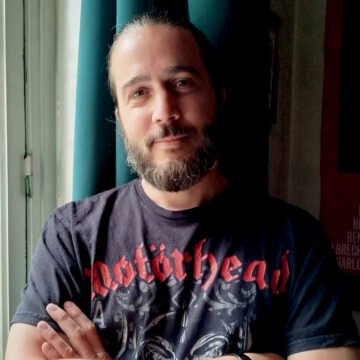
Yves Jeuland is the author and director of some thirty documentary films. Alternating between archival films and cinéma vérité, his work focuses primarily on observing French society, past and present. His film “All about Yves Montand” (2021), like his documentaries on Charlie Chaplin (2020) and Volodymyr Zelensky (2025), is at the crossroads of his lifelong passions: politicians, artists, and song. He has directed three films for the big screen, including “Le Président” with Georges Frêche (2010) and “Les Gens du Monde” (official selection at the Cannes Film Festival in 2014).

Born in 1986 in Strasbourg, Noé Debré decided early on that he wanted to be a doctor. Lacking the skills and empathy, he instead pursued a career in screenwriting. Moving to Paris, he met Thomas Bidegain, who taught him everything one needs to know about writing a script, especially how to lure directors and abandon all self-esteem. Since then, he has collaborated on a number of films including Jacques Audiard’s “Dheepan” (Palme d’Or at Cannes), Romain Gavras’ “The World is yours” and Tom McCarthy’s “Stillwater”. He has also directed some short films and despite the protests of his family and friends, completed a feature film as well, “le Dernier des Juifs”. He is now thinking of moving away from showbusiness to rigorously prepare for the end of the world, which he, along with most serious climate scientists, thinks is impending.

Jay Rabinowitz, ACE, has been working in film post production since graduating from NYU in 1984. His over-20 year collaboration with Jim Jarmusch is the defining factor of his career. He has worked with some of the most brilliant film directors of all time, on such films as Requiem for a Dream, The Tree of Life, I’m Not There, and 8 Mile. He recently finished work on Is God Is, in collaboration with Aleshea Harris.

Jean-Christophe Bouzy is a French editor. A graduate of La Fémis, he is known for his long-standing collaboration with Julia Ducournau on Raw, Titane (Palme d’Or 2021), and Alpha (official competition at the 2025 Cannes Film Festival). He has also worked with other directors such as Jérémy Clapin on Pendant ce temps sur terre, Siew Hua Yeo on Stranger Eyes, Jean-Paul Rouve on Lola et ses Frères, and Elliott Lester on The Thicket. His tastes and skills have drawn him to both commercial and auteur cinema, including comedy, drama and genre films. Bouzy is also a screenwriter and has co-written several feature films, including Let the Girls Play and Titane. He is a die-hard fan of Tom Cruise and Jean-Pierre Melville.